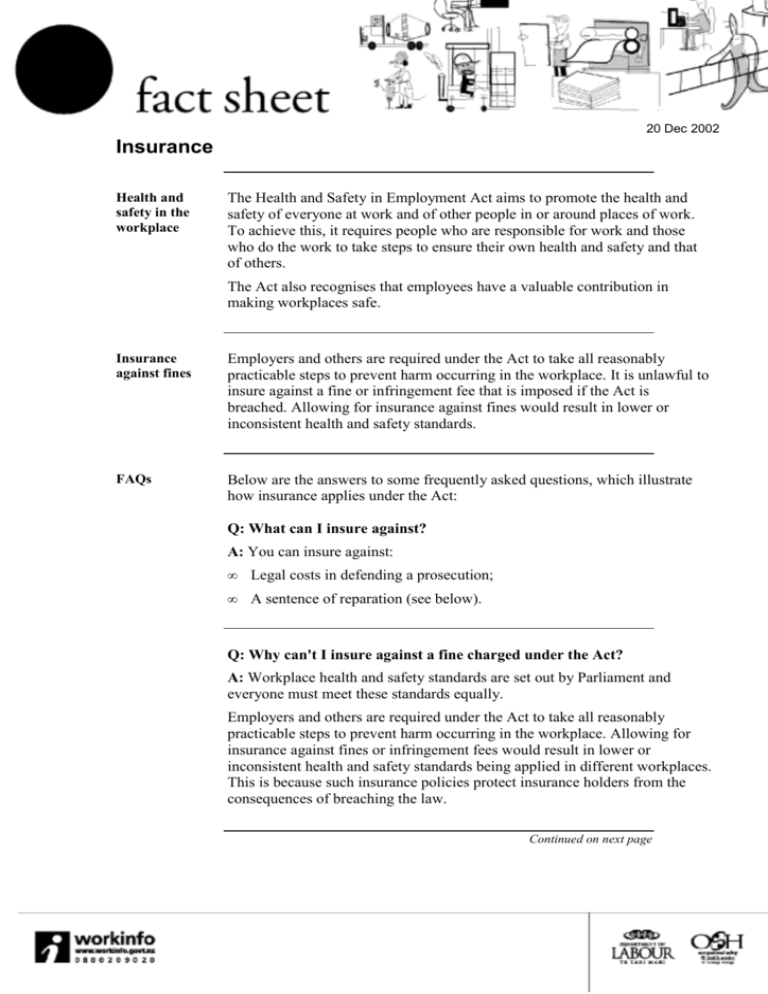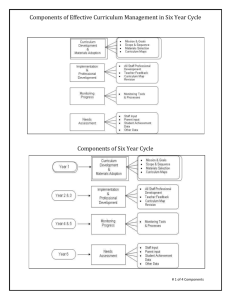Insurance
advertisement

20 Dec 2002 Insurance Health and safety in the workplace The Health and Safety in Employment Act aims to promote the health and safety of everyone at work and of other people in or around places of work. To achieve this, it requires people who are responsible for work and those who do the work to take steps to ensure their own health and safety and that of others. The Act also recognises that employees have a valuable contribution in making workplaces safe. Insurance against fines Employers and others are required under the Act to take all reasonably practicable steps to prevent harm occurring in the workplace. It is unlawful to insure against a fine or infringement fee that is imposed if the Act is breached. Allowing for insurance against fines would result in lower or inconsistent health and safety standards. FAQs Below are the answers to some frequently asked questions, which illustrate how insurance applies under the Act: Q: What can I insure against? A: You can insure against: • Legal costs in defending a prosecution; • A sentence of reparation (see below). Q: Why can't I insure against a fine charged under the Act? A: Workplace health and safety standards are set out by Parliament and everyone must meet these standards equally. Employers and others are required under the Act to take all reasonably practicable steps to prevent harm occurring in the workplace. Allowing for insurance against fines or infringement fees would result in lower or inconsistent health and safety standards being applied in different workplaces. This is because such insurance policies protect insurance holders from the consequences of breaching the law. Continued on next page Insurance, continued Q: I already have a policy that insures me and/or my company if we are fined under the Act. What will happen to my insurance policy? A: If you have an insurance policy that indemnifies you or your company against a fine under the Act, you should contact your insurance company as soon as possible. In some cases, it may be possible to receive a refund of an amount of your premium. Q: What is the difference between a fine and a sentence of reparation? A: The main difference in terms of the Act is that you can no longer insure against a fine, but you may insure against a reparation. Being sentenced to pay a fine means that upon conviction for an offence against the Act, the Court will refer to the penalty provisions in the Act and determine a sum of money that you are required to pay the Court. The Court takes a number of factors into account when determining the level of any fine, and these factors are set out in the Act. Being sentenced to pay reparation means that upon conviction for an offence against the Act, you are required to pay a sum of money to the party who has suffered loss as a result of your actions. Reparation can only be imposed in particular circumstances and is most likely to be common where a person has suffered loss or damage to property. Further information This information is a guide only and may not be accurate for all situations. It should not be used as a substitute for legal or other expert advice. For further information, call Workinfo on 0800 20 90 20, or visit their website at www.workinfo.govt.nz











